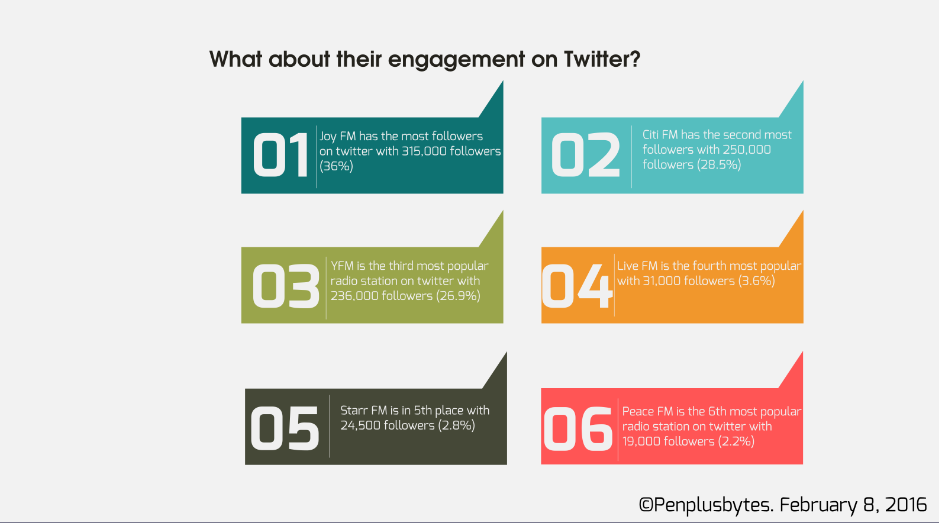
Image from Penplusbytes's study of social media use by media houses in Ghana. Image used with permission.
Some countries in Africa have developed a routine habit of blocking social media platforms before, during and after elections citing “security concerns”.
During the recent elections held in Uganda, for example, the government ordered telecommunication companies to block access to popular social media platforms. Social media platforms were also blocked ahead of Ugandan President Museveni's inauguration.
Uganda and Nigeria are two countries that have recently indicated their intentions to impose stricter controls over social media, and Ghana, it appears, may be joining them.
‘We are thinking about it’
In Ghana, the Inspector General of Police (IGP), John Kudalor, has hinted Ghanaian authorities might consider shutting down social media platforms during elections due to take place on November 7.
The IGP emphasised that the potential shutdown of social media platforms during elections is based on the fact that some people abuse the space during voting.
There have been complaints that social media users spread misinformation and rumours about violations and violence at polling stations on election day.
In a quotes published by local media outlet Citi FM he said:
At one stage I said that if it becomes critical on the eve and also on the election day, we shall block all social media as other countries have done. We’re thinking about it. We are also thinking about the other alternative that the police should be IT compliant and get our own social media [account] to be able to stop these things on time. We are looking at the variables and come D-Day, we’ll come out with a decision.
The news of the potential shutdown unleashed a wave of negative reactions on TV, radio and social media platforms.
In response to the IGP's statement, the Alliance for Accountable Governance (AFAG), berated the mooted block.
Blocking or restricting access to social media is a blatant violation of freedom of expression. The 1992 constitution declares in no equivocal terms that: All persons shall have the right to freedom of speech and expression, which shall include freedom of the press and other media. The constitution guarantees that the press and every individual in Ghana has the right to say anything that they want, whenever that they want and wherever that they want. The position of the IGP in relation to the effect of social media on election suggests that the Ghana police lacks appreciation of the use of online social networking technology in a 21st century world as a platform of engagement. This kind of thinking is unacceptable.
Kinna Likimani, of the social media platform dedicated to election coverage in Ghana, Ghana Decides, also stated during an interview:
We are not a country that subscribes to heavy handed repressive tactics otherwise we will not be in a democracy. What we need to do is that within our democratic dispensation, we educate our citizens. The Police needs to understand and come on and we all work together. There is a huge space that even the Police can occupy on social media. Ways by which we can inform Ghanaians, ways in which we can help them in their job.
Not only the Police , including the EC who is now on social media. The last election, the EC released the results on Facebook. The Peace Council needs to be on social media, the government needs to be on social media. It is a platform for informing and together we can Police ourselves but to ascribe to heavy handed repressive tactics, I repeat it is not a democratic best practice and it doesn’t suite the path we are on as Ghanaians. We close down social media and then what. What message do we send to ourselves as Ghanaians. That we can’t handle ourselves.
A well known private legal practitioner, Ace Ankomah wanted to know which law will be used to block social media and prevent access to information which is a key democratic right in Ghana:
The right and freedom of information and communication is absolutely guaranteed and the excuse to it ought to be in accordance with law in a democratic society. So for even considering this the IGP is playing with a possible legal action from restraining it from doing it. On the basis of which law is he going to stop access to information? Our rights to communication cannot be infringed with under the provisions of the constitution unless it is in accordance with law and not just law, law that is necessary in a democratic society. So technically and legally they will struggle.
Nigeria did election without banning social media and the report show that social media helped. Uganda banned it so on what basis are we going the Ugandan way instead of going the Nigerian way? Let’s strengthen the traditional media to be able to give out information and give it out quickly so that we will know that the key thing is traditional media. So that when somebody put out some diabolic message, traditional media can quickly kill it. If you shut down social media, we can still talk and people can still do their diabolic.
Facebookers such as Stephen Saan-Ire regretted the fact that a country traditionally viewed as one of the continent's stronger democracies was seemingly falling into line with autocracies like Uganda, while Twitter also lined up to pan the potential block.
@Joy997FM this is only the act of a sleeping country, well structured countries don't even think about stuffs like blocking social media!!!
— Francis Yanch (@phada05) May 27, 2016
Most people, however, have been supportive of the suggestion that the Ghanaian Police should fine-tune its own social media skills in order to engage with the public.
Clearly, this is a preferable approach to information management than simply blocking the platforms.
Read Full Story from Global Voices Advocacy https://advox.globalvoices.org/2016/05/30/ghanaians-oppose-shutdown-of-social-media-platforms-during-elections/
This article by Kofi Yeboah originally appeared on advocacy.globalvoicesonline.org on May 30, 2016 at 06:00AM